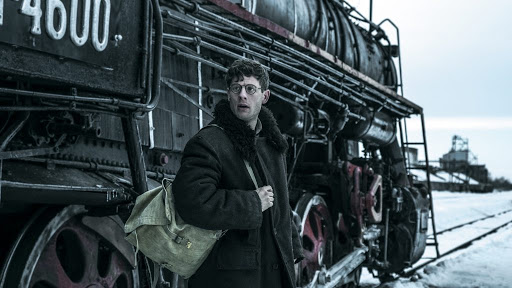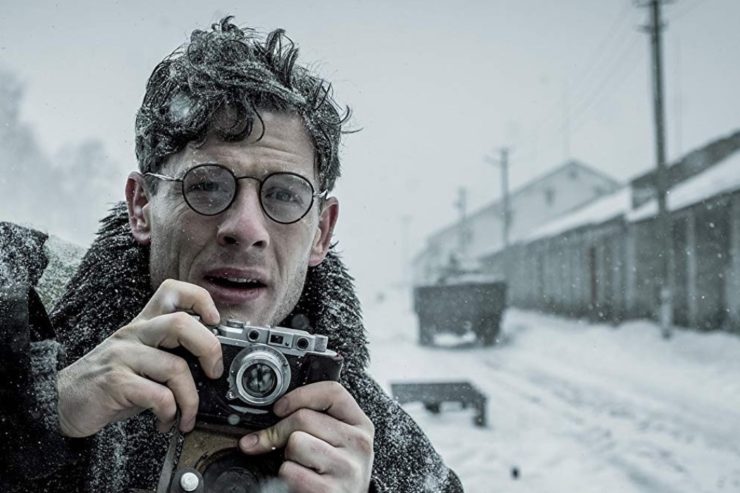“You are rather dull, Mr. Jones.”
Fictional reporters usually come in two flavours; the shambolic, washed-up hellraisers who drown themselves in a sea of booze and pills, and the clean-cut, straight arrows who run on passion and bleed journalistic integrity. People don’t seem to like the second type very much, even if they know they should. They’re just not as fun, all stuffy and self-righteous. It’s probably why nobody ever wants to listen to them.
Gareth Jones (James Norton) is the foreign advisor to British Prime Minister Lloyd George. We open on him addressing the PM’s cabinet of identically fat, bald and middle-aged politicians who laugh at his suggestion that Adolf Hitler, the new German Chancellor, could be a bigger threat than they realise. They brush off his words as doomsaying: “Hitler is going to learn that there’s a big difference between holding a rally and running a country.”
A Trump reference? You bet.
I suppose there’s no way you could tell a story about honest journalism overcoming misinformation without making some parallels to the modern day, which is bad news for anyone who uses period films as a way of escaping modern woes. At least these parallels never become too heavy-handed or clunky. Jones says that he’s only interested in the truth, to which someone responds “Who’s truth?”.
The particular truth Mr Jones is interested in concerns the so-called “Russian Question”. In 1931, Stalin spoke of the need to modernise Russia. “We are fifty or a hundred years behind the advanced countries. We must make good this distance in ten years.” This plan seemed impossible, especially for a country that is ostensibly broke, but somehow Stalin is making good on his word; Russia is industrialising at an unbelievable rate.
This all sounds too good to be true and Jones smells a rat. He hops on a train to Moscow with nothing but his luggage, a letter of recommendation and the wild hope of getting an interview with Stalin himself. Nobody fancies his chances, least of all Walter Duranty (Peter Sarsgaard), the slimy British ambassador who seems more interested in keeping the Soviets happy than aiding Jones on his quest.

Help comes instead from his secretary, Ada (Vanessa Kirby, who I spent the first hour thinking was Natalie Dormer). She repeatedly warns Jones to abandon his search for the truth, a road that will most likely end with him getting a bullet in the back, but when it becomes obvious that he’s not for turning, she relents and tells him that the answers he’s looking for are waiting in the Soviet-controlled Ukraine.
Ada is one of the “good ones” but she’s less willing to put her neck on the line to oppose a regime she sees as unstoppable. She’s jaded but still earnest, which makes her a nice foil to the unambiguously moral Jones. The inevitable chemistry that strikes up between them gives the film a humanising touch to a fairly procedural story.
Not that it doesn’t want to be more than a procedural story. Director Agnieszka Holland is one of Poland’s best known and most acclaimed directors but you can feel her struggling within the confines of a rote narrative. Every so often, she tries to inject the film with wild and spontaneous energy, like a shot of adrenaline directly into its heart.
The result is the editing equivalent of a panic attack.
Jones rides the train to Moscow and suddenly the train’s movements become frantic and disorienting. A series of disjointed images blur before our eyes, with random cuts to, among other things, Soviet propaganda films. In a later scene, Jones is cycling through the Welsh countryside and the footage is immediately cranked up to Benny Hill speeds. You can’t create drama out of thin air and these bizarre and confusing attempts only make the film feel disjointed and uncertain of itself.
The subject matter is worthy and where Jones’ journey leads him is both eye-opening and shocking, but post-production tricks can’t mask what is a mildly engaging but ultimately predictable story. There is a great movie to be made on this topic but unfortunately you are rather dull, Mr. Jones.


